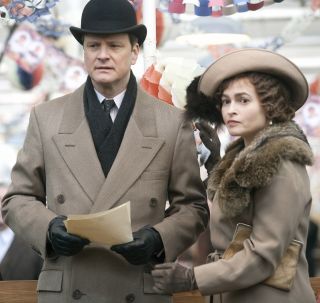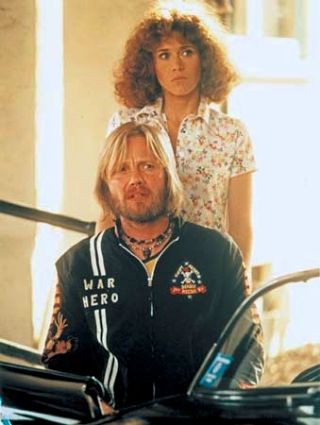Child Development
Oscar Films That Realistically Depict Life for the Disabled
12 Oscar-nominated films that are honest in their depiction of the disabled.
Posted February 17, 2014
What follows is not an exhaustive list, but a description of twelve films that moved me deeply, from newest to oldest. I've seen all of them multiple times.

The King’s Speech — 2010
Oscar Count: Won: Best Picture; Best Director (Tom Hopper); Best Actor (Colin Firth); Best Original Screenplay. Eight other nominations, including Best Supporting Actor (Geoffrey Rush) and Best Supporting Actress (Helena Bonham Carter).
Bertie (Colin Firth) unexpectedly becomes the King of England when his older brother, Edward VIII, abdicates shortly after ascending the throne. As George VI, Bertie faces two serious problems: his country is on the brink of World War II, and he is barely able to speak in public due to a debilitating speech impediment.
His wife (Helena Bonham Carter)—later known as the Queen Mum—arranges for him to see a speech therapist, Lionel Logue (Geoffrey Rush). Logue’s techniques are so unorthodox that, at first, the King balks at working with him. Eventually, they form a professional and personal bond that lasts a lifetime. At the film’s end, with Logue silently coaching him, the King delivers a crucial radio address that rallies the nation to the task at hand: defeating the Nazis. (Some historians have disputed the historical accuracy of the sympathetic portrayal of the King, but others have defended it.)
I’ve watched this movie more than once and find it thoroughly absorbing for several reasons: it’s a period piece, filmed with careful attention to detail; it has more than one interesting storyline (including that of the failed actor, Logue); it even has its share of humor (Helena Bonham Carter is very funny as she behaves like a proper and stuffy royal, while simultaneously trying to connect with “ordinary” people, such as Logue’s wife.)
At its heart, though, the movie is about a person finding his voice, literally and metaphorically. In this sense, it doesn’t matter what his station in life is.
Babel — 2006
Oscar count: Won: Best Music, Original Score. Several other nominations, including Best Picture; Best Director (Alejandro González Iñárritu); Best Supporting Actress (Rinko Kikuchi); Best Original Screenplay.
Babel is not a feel-good movie. It contains several interrelated stories, set in Morocco, Mexico, and Japan. As the title suggests, the plot centers around failed communication and the tragic consequences that can follow. The movie features a host of marquee stars, from Brad Pitt to Cate Blanchett. I’ve included it here for one reason: the performance of Rinko Kikuchi (who was nominated for Best Supporting Actress).
Kikuchi plays a Japanese teenager who is deaf and also doesn’t speak. Her mother recently committed suicide and her father is emotionally distant. The storyline centers around her search for affection in a life where her communication skills are severely impaired. In her desperation, she acts out in inappropriate ways, including disrobing in front of a police officer, as if the only way she can communicate with others is through physical contact. Rinko Kikuchi’s depiction of what it’s like to experience the world as a person without hearing is informative, moving, and riveting; it’s reason alone to see this movie.
Frida — 2002
Oscar count. Won: Best Music, Original Score; Best Make-up. Several other nominations, including Best Actress (Salma Hayek).

In this biopic, Salma Hayek plays the Mexican artist, Frida Kahlo. Kahlo has polio as a child, which permanently stunts the growth of her right leg. Then, while a young student at university, she’s almost killed in a trolley accident in which her body is pierced with a steel rod and her back is broken. She is never pain-free again.
The movie is a feast for the eyes and ears, filmed with bright colors and great music. The heart of the story, though, is Kahlo, whose fiery spirit is captured fearlessly by Salma Hayek. Despite often being in a body cast and having to paint mostly from the bed, Kahlo creates an extraordinary body of art, frequently depicting on canvas her physical and mental anguish. She was a complex and remarkable woman.
A Beautiful Mind — 2001
Oscar count. Won: Best Picture; Best Director (Ron Howard); Best Supporting Actress (Jennifer Connelly); Best Adapted Screenplay. Several other nominations, including Best Actor (Russell Crowe).
A Beautiful Mind is based on the biography of Nobel Prize Winner, John Forbes Nash, Jr., who is a brilliant mathematician and a diagnosed schizophrenic. Nash has made lasting contributions in many fields, notably game theory, while at the same time struggling with paranoid delusions. Russell Crowe is outstanding in this movie. He doesn’t opt for a sensationalistic portrayal of Nash. Instead, he brings out Nash’s humanity. As a result, we don’t recoil from his mental illness; we see Nash as a brilliant and caring human being who has a devastating disease. (Note: as with The King’s Speech, some people have disputed the historical accuracy of parts of the film.)
Iris — 2001
Oscar count: Won: Best Supporting Actor (Jim Broadbent). Nominated for: Best Actress (Judi Dench); Best Supporting Actress (Kate Winslet).
Famed British philosopher and novelist, Iris Murdoch (Judi Dench), battles Alzheimer’s disease as her husband, the literary critic John Bayley (Jim Broadbent), struggles to care for her. Kate Winslet plays the younger Murdoch and Hugh Bonneville (Lord Grantham to Downton Abbey fans) plays the younger Bayley.
This biopic is based on John Bayley’s memoirs and traces his 40-year relationship with Murdoch. The film moves seamlessly between the older Murdoch, whose mind is slipping into dementia, and the younger Murdoch, who is a strong-willed and wickedly funny free spirit. The contrast between these two periods of her life is difficult to watch at times. What makes this movie outstanding is the strong acting from all four leads. Broadbent, in particular, is heartbreaking as the older Murdoch’s husband, who is slowly losing his life-long partner in love and friendship. His helplessness and despair will touch your heart.
Four Weddings and a Funeral — 1994
Oscar count. Nominated for: Best Picture and Best Original Screenplay.

Charles (Hugh Grant’s character) falls in love with Carrie (Andie MacDowell’s character), and that’s all you really need to know about the plot. It’s a funny and sophisticated romantic comedy, the kind that’s rare today. (Please indulge this side rant: what ever happened to the smartly scripted Rom Com? The genre seems to have given way to the belief that if a studio casts two stars opposite each other, the movie will be a hit no matter how dumb the plot and bad the screenplay.)
Charles’ brother, David (David Bower), is deaf. It may be a minor role, but his deafness plays a crucial role in several scenes, and I love how Charles and David use sign language to secretly share what they really think of the people they’re with—often signing what would be highly inappropriate if spoken out loud!
Philadelphia — 1993
Oscar count. Won: Best Actor (Tom Hanks); Best Song (“Streets of Philadelphia”). Several other nominations.
Tom Hanks plays high-profile attorney, Andrew Beckett, who is dying of AIDS. He hires another attorney, Joe Miller (Denzel Washington), to help sue his employer for firing him. This is the first big budget movie made about AIDS. In my opinion, Denzel Washington deserved an Oscar for his performance. The most powerful and moving scenes in the movie show his transformation from a self-interested homophobic who just hopes to get rich and famous from the case, to someone who sees Beckett as a fellow human being, with the same hopes and dreams that he, Miller, has.
Passion Fish — 1992
Oscar count: Nominated for: Best Actress (Mary McDonnell); Best Original Screenplay.

Imagine being a Southern belle who goes to New York City and makes it big as a soap opera star. Then, overnight, you become a paraplegic due to an auto accident. After rehab, you have no choice but to return to your empty childhood home in the hot and humid Louisiana Bayou. You spend the next few months tormented by this turn your life has taken—driving away, with your boozing and bitterness, every person you hire to assist you. This is May-Alice, played by Mary McDonnell.
Then one day, Chantelle (the incomparable Alfre Woodard), applies for the post. She also needs to turn her life around, so much so, that she sticks with the job despite May-Alice’s attempts to drive her away like she has the others. Although the movie features other richly-drawn characters—some comic, some sad, even potential beaus for the two women—it’s about the relationship between May-Alice and Chantelle. In their roles of unequal power—that of employer and employee—they find friendship, and then redemption. It’s one of my favorite movies. I recently watched it again for the fourth or fifth time, and it’s as good as it was when I first saw it over 20 years ago.
My Left Foot — 1989
Oscar Count: Won: Best Actor (Daniel Day-Lewis); Best Supporting Actress (Brenda Fricker). Nominated for: Best Picture; Best Director (Jim Sheridan); Best Adapted Screenplay.
My Left Foot is based on the autobiography of Christy Brown, played superbly by Daniel Day-Lewis. Brown is born with severe cerebral palsy into a large, loving family in a Dublin slum. He only has control over his left foot. (Reflect on that for a bit.) Despite a difficult childhood in which he is treated by most people as lacking any intelligence, he becomes a painter, a poet, and a novelist—using only his mind and the toes of his left foot.
What makes this movie great is the character of Christy Brown himself. He isn’t a pious, saintly person. He’s a complicated man who’s not always easy to like. He drinks too much and can be demanding and arrogant at times. But he’s a fighter, a survivor, and a gifted artist. I came away from this movie speechless with wonder at this real-life human being.
Rain Man — 1988
Oscar Count. Won: Best Picture; Best Director (Barry Levinson); Best Actor (Dustin Hoffman); Best Original Screenplay. Several other nominations.
After his father dies, Charlie Babbitt (Tom Cruise), discovers that his father’s $3 million fortune has been put into a trust to support an older brother he didn’t know he had. The brother, Raymond (Dustin Hoffman), has been institutionalized most of his life because of autism. Charlie finds Raymond and takes him out of the institution, hoping to get his hands on the money. As they embark on a cross-country trip back to Los Angeles, it becomes clear that Charlie sees Raymond as excess baggage. As a result of his autism, Raymond has some astounding skills, but he can’t relate emotionally to Charlie. Yet Charlie, in his own way, is just as emotionally stunted.
As the movie progresses, Charlie gradually comes to love Raymond just as he is. I feel the same way about Tom Cruise in this movie as I do about Denzel Washington in Philadelphia. To me, they are the real stars (even though their co-stars won Oscars), because they play the characters who are transformed and, in effect, “awaken” during the course of the movie. If you’ve ever questioned whether Tom Cruise can give a great performance, watch this film.
Children of a Lesser God — 1986
Oscar count. Won: Best Actress (Marlee Matlin). Nominated for: Best Picture; Best Actor (William Hurt); Best Supporting Actress (Piper Laurie); Best Adapted Screenplay.
Marlee Matlin plays a former student at a school for the deaf who resists the efforts of a new teacher (William Hurt) to show her how to read lips and use her deaf voice. Matlin is excellent in this movie—at once strong-willed and vulnerable. It’s one of my favorite love stories. Some have criticized the movie for this, saying it’s a love story that uses deafness as a gimmick, but I didn’t see it that way at all. In fact, I learned a lot about deafness from watching the movie, almost as if it were a docu-drama.
Coming Home — 1978
Oscar count. Won: Best Actor (John Voight); Best Actress (Jane Fonda); Best Original Screenplay. Nominated for: Best Picture; Best Director (Hal Ashby); Best Supporting Actor (Bruce Dern); Best Supporting Actress (Penelope Milford); Best Film Editing.

John Voight plays a Vietnam veteran who is paralyzed from a spinal cord injury suffered in combat. He is also suffering from (what today we would call) PTSD. He and a hospital volunteer (Jane Fonda) fall in love, even though her husband (Bruce Dern) is fighting in Vietnam.
Some readers may object to Fonda’s character being married (although just about every film I considered had one partner or the other being unfaithful at some point). Nevertheless, Coming Home is the first movie that realistically portrays a romance between a person who is able-bodied and another who suffers from a devastating disability—realistic in that it doesn’t shy away from depicting both the emotional and physical challenges they face.
I remember reading a comment about Coming Home made by man a who is paraplegic. He said that the film led to a whole generation of women looking at men in wheelchairs in a completely different light. That’s quite an accomplishment in filmmaking.
© 2014 Toni Bernhard. Thank you for reading my work. I'm the author of three books:
How to Live Well with Chronic Pain and Illness: A Mindful Guide (2015)
How to Wake Up: A Buddhist-Inspired Guide to Navigating Joy and Sorrow (2013)
All of my books are available in audio format from Amazon, audible.com, and iTunes.
Visit www.tonibernhard.com for more information and buying options.
Using the envelope icon, you can email this piece to others. I'm active on Facebook, Pinterest, and Twitter.




